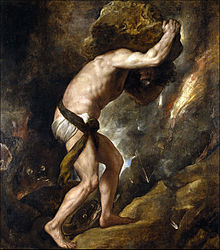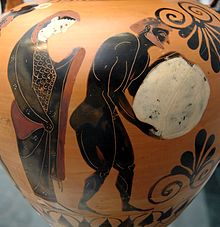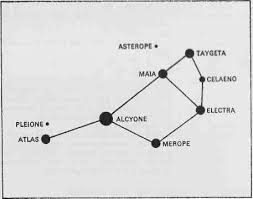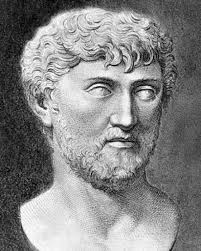 Sisyphus was the son of Aiolou (Greek: Αιόλου, god of the winds) and Enarety (Greek: Εναρέτη, daughter of Deimachus, ambassador of the Seleucid Empire in India) and the founder and first king of Corinth. For some, he was the cleverest and for others the slyest person at that time. However, his name can also mean ‘the wisest’ (Greek: σοφός), as well as of ‘virtuous qualities, merit’.
Sisyphus was the son of Aiolou (Greek: Αιόλου, god of the winds) and Enarety (Greek: Εναρέτη, daughter of Deimachus, ambassador of the Seleucid Empire in India) and the founder and first king of Corinth. For some, he was the cleverest and for others the slyest person at that time. However, his name can also mean ‘the wisest’ (Greek: σοφός), as well as of ‘virtuous qualities, merit’.
Sisyphus by Titan (1584-49) Prado Museum, Madrid Spain
Sisyphus lived during a period when agriculture and animal husbandry was of great importance and when the stealing of sheep and cows was prevalent. Autolycus (Greek: Αυτόλυκος – αυτό = self, + λύκος = wolf, in other words, those that like wolves like to affect the property of others), was known for the thefts that he committed, but when asked he would swear that he had not stolen anything. He tried to steal from Sisyphus as well, but Sisyphus could not be outwitted because he branded his sheep and marked other pieces of property so that it could be easily recognised and therefore Autolycus could not fool him. The use of letters and words helped to consolidate ownership and in this way developed the need for writing and the education of the people.
Sisyphus married Merope, the Muse of Wisdom, Learning, Culture and Love. She gave to the people of Corinth the chance to become educated and in this way gave knowledge to them and raised their standard of living. The word ‘museum’ comes from ‘muse’, meaning the ‘temple of knowledge’. Sisyphus and Merope are seen as the twin poles in the relationship between man and woman.
One explanation as to why Sisyphus was made to roll the enormous boulder up the hill refers to Zeus, king of the Olympian gods. He was angry that Sisyphus was allowing his people to be educated and to question the decisions made by him. Sisyphus overestimated his own competence and capabilities, believing that his cleverness surpassed that of Zeus himself. Zeus ordered Hades to take Sisyphus down to Tartarus and to chain him there as punishment. However, Sisyphus was clever enough to chain Hades instead. This meant that from that moment on, no man would die and sacrifices could not be made.
 Zeus was outraged at the turn of events. He ordered Ari, god of the Underworld, to free Hades. Ari did so and punished Sisyphus for his self-aggrandizing, craftiness and deceitfulness by forcing him to roll an immense boulder incessantly up the hill.
Zeus was outraged at the turn of events. He ordered Ari, god of the Underworld, to free Hades. Ari did so and punished Sisyphus for his self-aggrandizing, craftiness and deceitfulness by forcing him to roll an immense boulder incessantly up the hill.
Persephone supervising Sisyphus in the Underworld, Attica black-figue Amphora (vase) c. 530 Bc.
However, Sisyphus was clever enough to have told his wife, Merope, not to carry out the usual death ritual where offerings would be made to the gods. Ari and his wife Persephone waited in vain for their gifts. In the end, Sisyphus persuaded them to allow him to go back to the Upper World so that he could order his wife, Merope, to carry out the death ritual. They did so, but instead of carrying out the ritual, Sisyphus refused to return to Hades and lived with his wife until a ripe old age.
Sisyphus is always pictured rolling an enormous boulder up the hill, only to have it roll down again. A number of interpretations have been given for this symbolic punishment that had been metred out to Sisyphus by the gods before his escape from the Underworld. One explanation is the uselessness and the frustration that someone feels when he cannot achieve his goal. A feeling of toiling against the odds and trying to find ways to overcome the hurdles found along one’s path. These acts of pointless activities are often described as ‘Sisyphean’. However, it also shows the fundamental conflict between what we want from life and what we find.

Another explanation is the inner strength that a person may have in order to climb to greater heights imbued by the support, tenderness and understanding of a loved one, in this case, Merope, Sisyphus’ wife, who stood by him throughout his ordeal. She was only one of the Pleiades to have married a mortal and who was punished for this action by putting her in the furthest part of the Pleiades constellation.

There are other interpretations for Sisyphus’ struggle to roll the boulder to the top of the hill. Lucretius, a Roman poet and philosopher (99 B.C – 55 B.C.) interprets the myth as ‘personifying politicians aspiring for political office and who are constantly defeated.’
Albert Camus, in his 1942 essay ‘The Myth of Sisyphus’, saw Sisyphus as ‘personifying the absurdity of human life’, but he concludes ‘one must imagine Sisyphus happy’ as ‘The struggle itself towards the heights is enough to fill a man’s heart.’ (Wikipedia)
Yianis Varoufakis, former Economic Minister for Greece, also used it to describe what Greece is going through due to the economic crisis that is being experienced in Greece. A very apt description.
No matter which interpretation is chosen, they all have something of the symbolism of Sisyphus rolling the boulder up the hill as man’s struggle against the odds is an eternal one.